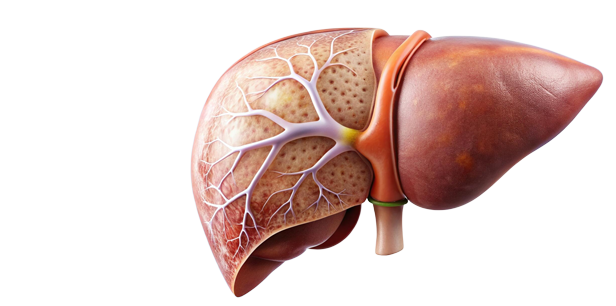A condition that harms and impairs the functioning of the liver is considered as liver disease. Numerous disorders can impair liver function, including those brought on by viruses, genetics, autoimmune diseases, alcohol, bad eating habits, and responses to medication with severity ranging from mild abnormalities to severe chronic conditions. The organ performs an array of essential functions, including processing the food and transporting the nutrients. Some liver conditions are brought on by viruses, such as hepatitis. Others may be brought on by drug use or excessive alcohol consumption. A persistent injury or scar tissue in the organ can cause cirrhosis. Liver disease can be categorised by varying health disorders, all of which ultimately culminate into end-stage liver disease or liver failure.


The following are some of the common liver infection symptoms:
The disease is manifested in different phases or types. A few may be genetic in origin, or they might arise due to microorganisms, toxins such as alcohol, or even drugs.

A medical condition called viral hepatitis damages and inflames the liver. Swelling that occurs when bodily tissues are hurt or infected is called inflammation and can cause damage to various organs. Hepatitis includes many varying types of viruses, like hepatitis A, B, C, D, and E. When the hepatitis virus stays in the body and your immune system is unable to eliminate it, you're diagnosed with chronic hepatitis. Complications due to chronic hepatitis include cancer, cirrhosis, and failure.

The cause of fatty liver is the cluster of excess fat found around the organ, which occurs mostly in overweight or obese patients. High liver fat levels increase the hazard of serious health issues, particularly diabetes, BP ailment, and kidney disorders.

Usually, it is developed in people, who consume alcohol for a long time as well with high intensity compared to others. And it is possible to have acute liver damage after drinking high quantities of alcohol more than usual at once.

An autoimmune liver disease develops when the body's immune system mistakenly identifies healthy, normal tissues as harmful invaders. Consequently, healthy liver cells are attacked by the immune system.

Chronic administration of some drugs can cause liver damage, leading to a condition called drug-induced liver disease. It occurs because the liver organ is the one that helps convert the body's chemicals for appropriate digestion, and overdosing on drugs, alcohol, and supplements can damage the liver's cells.
The principle of homeopathy believes that in addition to the influence of exogenous agents such as germs, viruses, etc., an individual's vulnerability to the disease's occurrence is primarily responsible for its development. Homeopathic treatment for liver disease is an alternative medical therapy that emphasises how a person responds to a unique environment. There is no harm that a patient will experience from homeopathic medications. Homeopathic medicine for liver effectively addresses viral infections, autoimmune diseases, and allergies. Homeopathic substances have applications in preventative and promotional healthcare in addition to their therapeutic applications.













